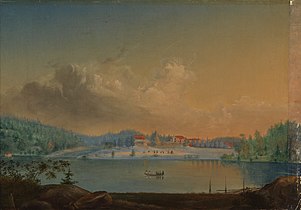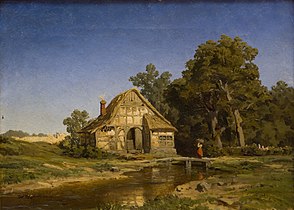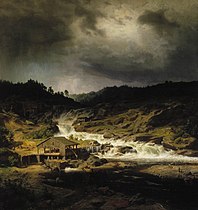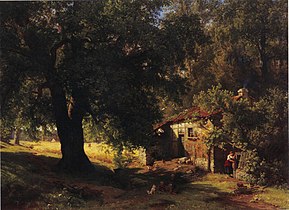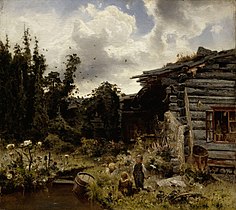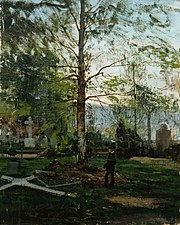Werner Holmberg
Werner Holmberg | |
|---|---|
 Portrait of Holmberg by Per Södermark in 1853 | |
| Born | 1 November 1830 |
| Died | 24 September 1860 (aged 29) |
| Nationality | Finnish |
Gustaf Werner Holmberg (1 November 1830 – 24 September 1860) was a Finnish landscape painter.[1][2]
Biography
[edit]Early life
[edit]Holmberg was born in Helsinki. His father was Olof Henrik Holmberg (1799–1863) and mother Josefina Gustava Federley (1806–1840). His mother passed away from a lung disease and Olof raised his six surviving children with the help of his sisters. Werner was interested in painting from a young age, taking private lessons from Pehr Adolf Kruskopf and later Magnus von Wright. He also learned oil painting from Johan Erik Lindh. In 1848 he became a student at the just-formed Academy of Fine Arts.[2] However his father Olof wanted his son to study law, so in his first year of university studies he also worked part-time at the National Board of Customs. At the university he learned painting from Berndt Godenhjelm and von Wright again. In 1850 he helped Robert Wilhelm Ekman paint frescoes in the Turku cathedral. In 1853 he finished his studies.[1]
-
Aurora, 1849
-
Midsummer Day's Night at Tornio, 1849
-
Storms or Degervik crown office at Kirkkonummi, 1852
Study at Düsseldorf
[edit]In July 1853 he moved to Düsseldorf as the first Finnish art student, after many Norwegian and Swedish art students had already gone there to study. He studied there under Hans Gude.[1] Erik Bodom was also recruited to help him with his work.[1] Nordic topics were popular in Germany, and he first focused on them with works such as The Kyrö Rapids. His breakthrough was in 1856 with Autumn Morning, and with the new-found fame he was able to quickly sell all of his paintings.[3] By this point Gude recognized Holmberg as fully trained and ended his tutorship, although they still kept close contact. As he ran out sketches of Finland, he began painting German landscapes.[1]
After the study at Düsseldorf
[edit]In 1857, after four years of being away, he returned to Finland, spending time with relatives. In the summer of 1858 he spent time in Norway and married Norwegian Anna Glad (1834–1909), a painter and daughter of the commander of Akershus Fortress, Christian Glad.[1][4] Gude also spent some time with Holmberg in Norway, painting watercolor sketches together near Christiania. Holmberg had settled to live in Düsseldorf where he spent the winter with Anna. They visited Finland in the summer of 1859 and spent time in Kuru.[1]
-
Rain at a Fjord Near Kristiania, 1858, watercolor
-
Landscape from Kuru in Morning Light, 1858
-
Landscape from Kuru in Evening Light, 1858
-
Forest in Rainy Weather, 1859
-
Autumn Morning in Ringerike, 1859
-
A Motif from Toriseva, 1859
Death
[edit]But by early 1860 he was having considerable difficulties with his lungs, relating to tuberculosis that he had already struggled with for years.[2] In the spring they had a daughter, Betzy (who later became a composer) but the couple also ran into some financial troubles as they had a harder time selling paintings.[5] The situation looked brighter again when he was invited to be a professor of landscape art in a new art school in Weimar. However, the invitation was cancelled and Werner was now bedridden with his sickness.[6][7] As he died in September, many of his paintings were left unfinished. One of his sisters and an older brother had also died from the same sickness.[1]
-
Cottage in Kuru, 1859
-
Finnish Hop Garden, 1860
-
Storm on Lake Näsijärvi, 1860
-
Mail Road in Häme, 1860
-
Road in Häme (A Hot Summer Day), 1860
-
Ideal Landscape, 1860, his last painting with slight final touches by Hans Gude
Legacy
[edit]Holmberg is the first Finnish painter to have received international recognition. His effect especially to Finnish landscape painting was large.[6][7][8]
-
Bust by Walter Runeberg, 1862
-
Werner Holmberg's Graveside, Victor Westerholm, 1882
-
Medallion of Holmberg on the facade of Ateneum by Ville Vallgren, 1887
See also
[edit]References
[edit]- ^ a b c d e f g h Reitala, Aimo (16 September 1997). "Holmberg, Werner (1830 - 1860)". Kansallisbiografia. Retrieved 26 May 2020.
- ^ a b c "Werner Holmberg". Lahteilla. Retrieved 26 May 2020.
- ^ Ahtola-Moorhouse, Leena (18 May 2016). "Werner Holmberg - Saksalainen maisema". Bukowskis. Retrieved 27 May 2020.
- ^ "Family Group Sheet". Federley. Retrieved 26 May 2020.
- ^ "306. Werner Holmberg (1830-1860)". Hagelstam. Retrieved 27 May 2020.
- ^ a b Kokko, Tiina (3 June 2017). "Keuhkotauti vei nuoren taiteilijan – Werner Holmberg ehti silti maisemamaalauksen mestariksi". Yle. Retrieved 26 May 2020.
- ^ a b Valjakka, Timo (8 July 2017). "Vain 30-vuotiaana kuollut Werner Holmberg uudisti suomalaisen maisemamaalauksen – Hänen töitään esittelevä näyttely on herkullinen kesäkohde". Helsingin Sanomat. Retrieved 26 May 2020.
- ^ Ekman-Kolari, Maria (7 June 2020). "Werner Holmberg oli suomalaisen maisemamaalauksen edelläkävijä – huomattava osa tauluista löysi ostajansa Suomen ulkopuolelta". Arvopaperi. Retrieved 9 August 2020.



